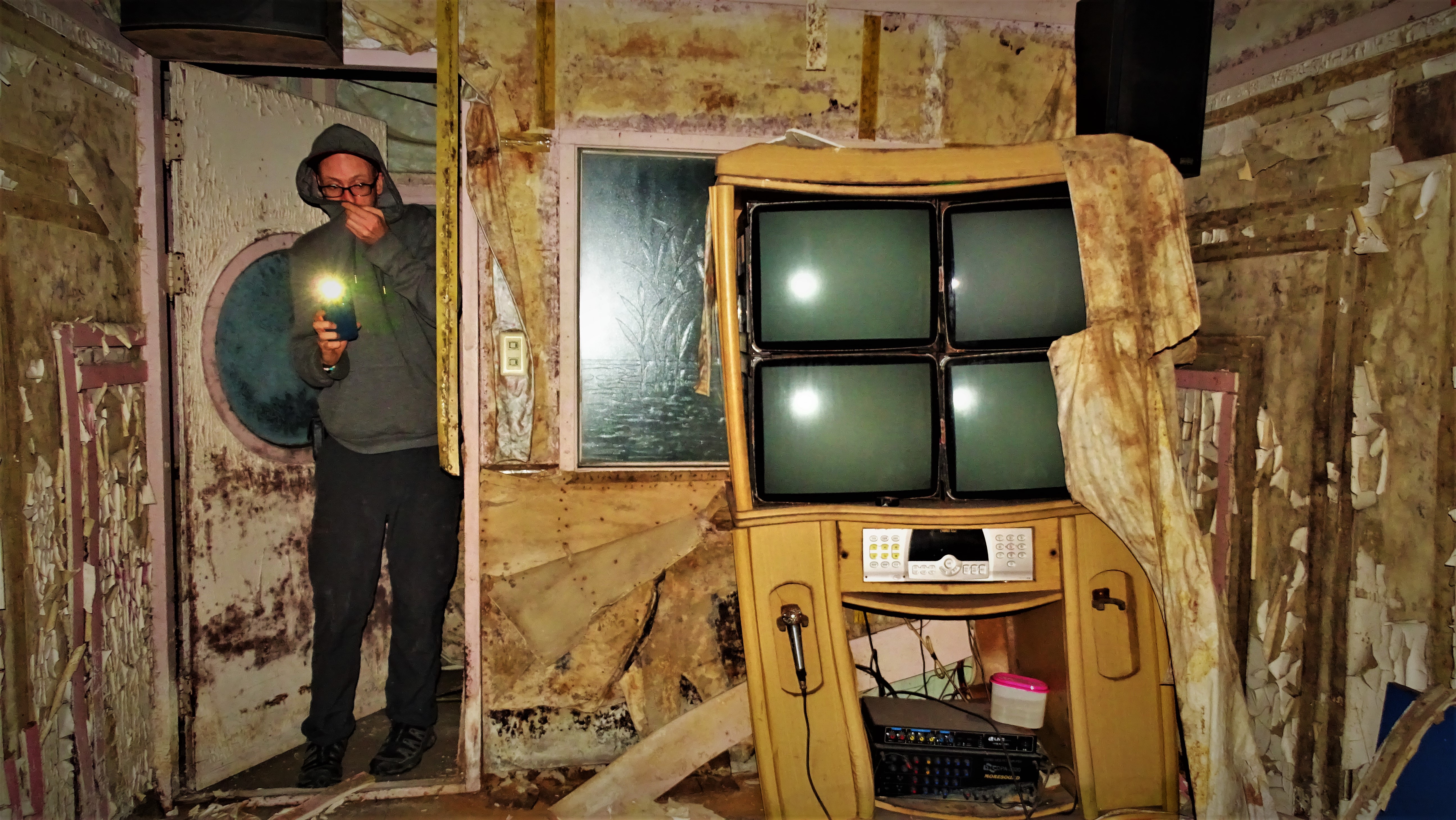Odds and (Dead) Ends
Written and photographed by Isaiah Winters
Rather than stick to a single topic, this month’s Lost in Gwangju will be a potpourri of sorts featuring a few of the city’s odds and (dead) ends that have been cluttering my workspace for the last year or so. Each photo comes with an interesting story all its own, though not necessarily one that’s feasible or worthwhile as a full article. Together I hope these loose ends make for moderately interesting content. So, without further ado, I bring you the loners and outcasts of my experiences in the City of Light.
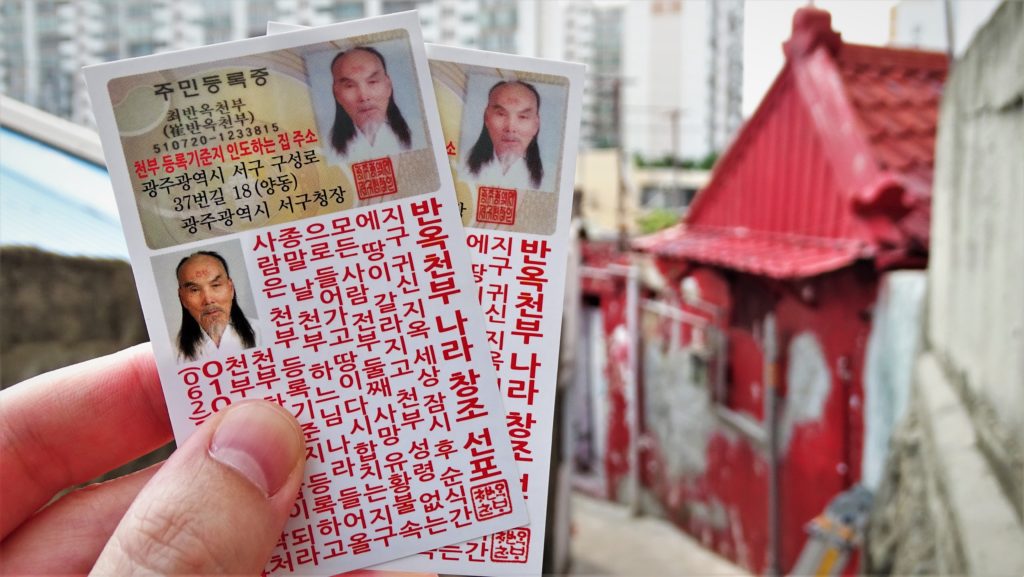
“Heavenly Father” (Yang-dong)
Along one of Yang-dong’s twisted back alleys is a peculiar red house with banners and business cards displayed along the exterior. Inside lives a man who calls himself “Heavenly Father” (천부, cheon-bu), and his publically available business cards proudly display his contact information, an end-of-the-world decree, and images of himself with “cheon-bu” apparently tattooed in red across his forehead. His uncanny resemblance to Charles Manson and his cult-like message have won themselves a coveted place in my wallet, where I always keep a few of his cards for comedic effect. I keep them jumbled together with my Subway and Starbucks cards and often crack a smile while fumbling through them at cashiers.
If my Korean language chops were better, I’d try to arrange an interview with “Heavenly Father” for a super special edition of Lost in Gwangju, but I don’t think that’ll happen any time soon. Of course, I could always ask for an interpreter to help out, but do I really want to subject a third party to such an interview? No way.
Surprisingly, “Heavenly Father” does have a Facebook account that I lazily reached out to months ago, but it was last active in 2013 and so probably won’t yield anything. Still, with fingers crossed, I’ve sent my friend request and am hopeful that one day we’ll be friends before it’s too late. According to his “creation proclamation” printed on the cards, there’s not much time left. In a short while, the Earth will split and all those without the Holy Spirit will die in sulfur fires and yada, yada, yada. The pitch is to get as many people as possible to register their address at “Heavenly Father’s” house to avoid this awful death and gain access to his heavenly country. Or something.
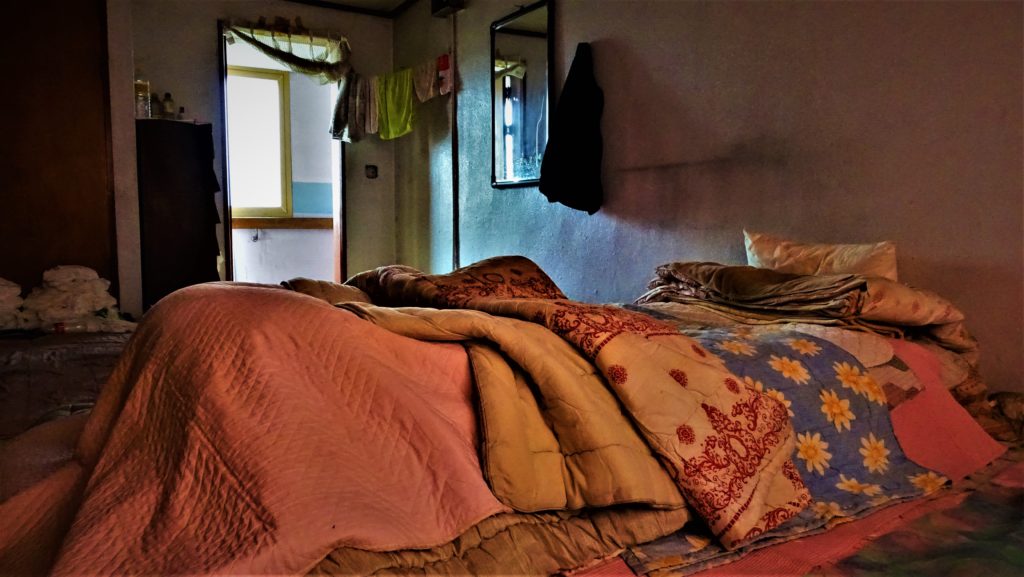
Death Bed (Gwangcheon-dong)
There’s an abandoned old folks’ home near the U-Square Bus Terminal that recently garnered brief national attention after a Korean internet broadcaster discovered the corpse of a 60-year-old man inside and reported it to the police. While shooting the building months before said discovery, a friend and I came across this rather cozy room that reeked of oily sheets and stale cigarette smoke. The room was clearly being lived in at the time and even had a framed portrait of an elderly man mounted on the wall nearby. There’s no way of knowing for sure whether this is where the corpse was later found or whether the man in the picture would later be the deceased, but it sure makes you think. Lacking enough information and not wanting to dig too deep into a person’s death, this is an article I’d rather not write.

Artistic Abandon (Jisan-dong)
Abandoned art is a topic that’s been recently written about in the Gwangju News, so there isn’t much I can do with this photo and its backstory that hasn’t already been done. It was taken on Gwangju International Community Day this year and features numerous pieces of art, most of which were handmade, left behind in a condemned building. The pieces were of course scattered about the room, but I took the time to gather them together in the corner for a final misfit family photo. Now that I’m shooting solo more often these days, I’ve had more time to stage photos like this, which comes with benefits and detriments. In this case, I think the effort was justified, though most of the time my arrangements end up being a huge waste of time.

Watered-Down Karaoke (Hak-dong)
In the bowels of an uninspiring building somewhere in Hak-dong is what we call the “Free Willy” norae-bang (노래방, karaoke room), named after the dated movie poster still hanging in its lobby. It seems to have suffered extensive flooding years ago and was left abandoned as a result. Today the TV stands are warped and leaning with an absolutely atrocious level of mold growing on the walls. Here my friend Ryan Berkebile does his best to keep out the mold spores, though to no avail. We’ve found three flooded underground karaoke rooms in Gwangju alone, with likely many more still undiscovered. Although these finds are interesting enough for an article of their own, the fact that they’re all underground in pitch black basements means that the photos are guaranteed to look terrible in the magazine, so no dice.
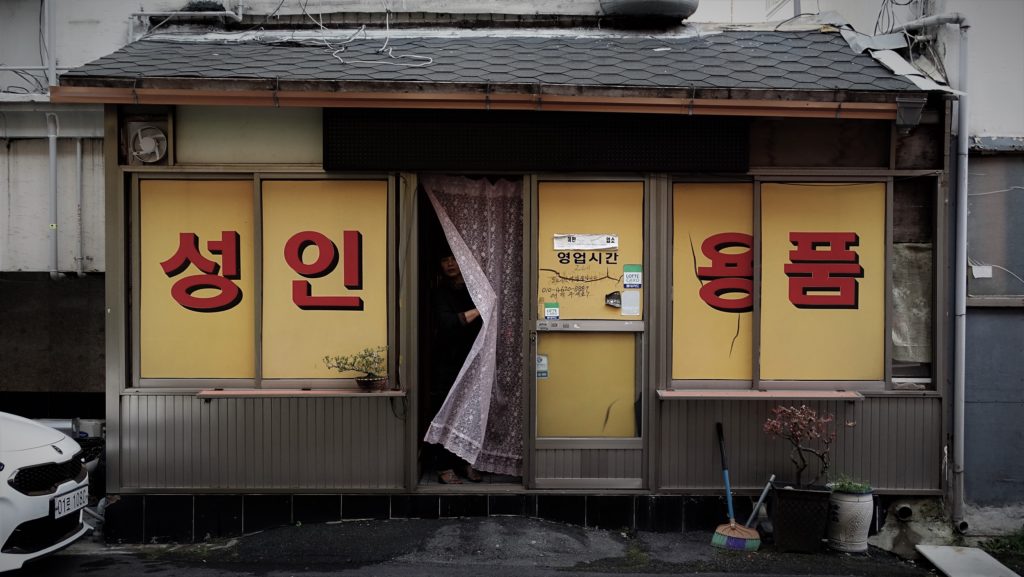
“Adult Products” (Daein-dong)
In a country where talk of intercourse is studiously avoided, sex shops occupy a niche no-man’s-land that few are brave enough to enter. I’ve always found these erotic speakeasies fascinating, and have often ventured inside to compare and contrast the products, their presentation, and the overall level of awkwardness offered at each. The most memorable products have included long-lashed rings made from camel and yak eyelids that are intended for a man’s member. Most cringe-inducing are always the silicone derrieres that sometimes come in disturbingly small sizes. The worst of all these shops is one in Yu-dong that’s water damaged, mold infested, and has a paltry selection of products, some of which look used in unsealed packages. As for this photo, it was taken in a neighborhood of mostly love motels near Daein Market. I snapped it quickly but wasn’t quick enough to avoid drawing the owner’s perfectly timed attention. The reason why this type of article wouldn’t work is that it’s actually been featured in the Gwangju News before, and I don’t think it’s worth exploring twice.
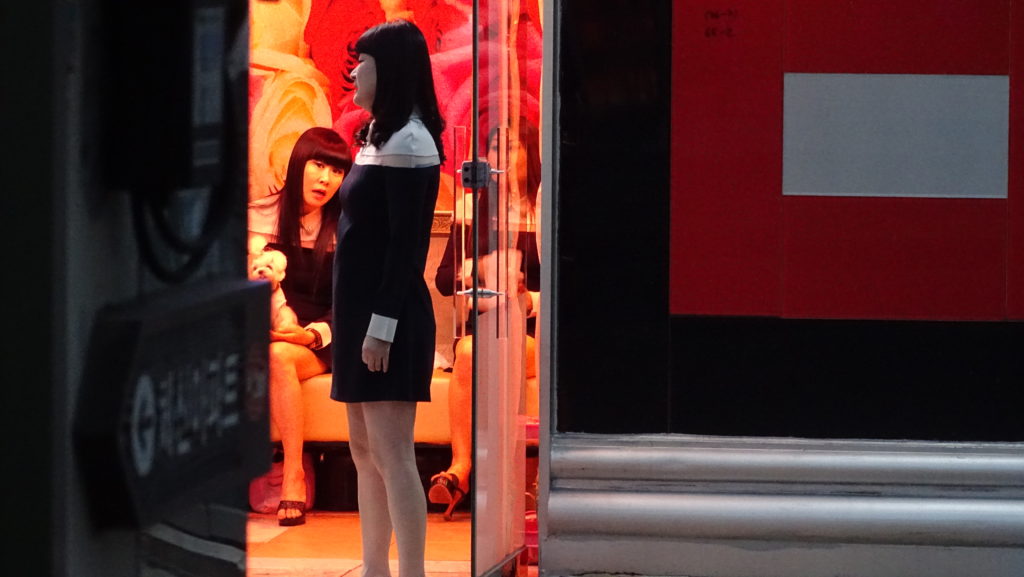
“Refreshing Breeze of Yeongwol” (Yang-dong)
This establishment is one of only very few still remaining in Yang-dong. Loosely translating to “Refreshing Breeze of Yeongwol,” it’s ostensibly a karaoke bar where a hostess sings songs with you in a private room. Half the street in this area used to have nothing but these karaoke bars back in the day, but now they’re quickly vanishing with only one or two still open. Over the years, we’ve managed to get into some that are abandoned, often with interesting results. For example, on a visit to the area years ago, a friend and I found old hepatitis C medication lying around in one of the back rooms. As for this photo, I’m usually stealthy enough to escape notice, but in this case my friend Ryan snapped a photo nearby with his analogue camera, which flashed conspicuously and blew my cover. This is yet another example of the kind of interview I’d like to arrange if my Korean weren’t so limited, but that I also wouldn’t subject an interpreter to, so it’ll have to stay on ice for now.
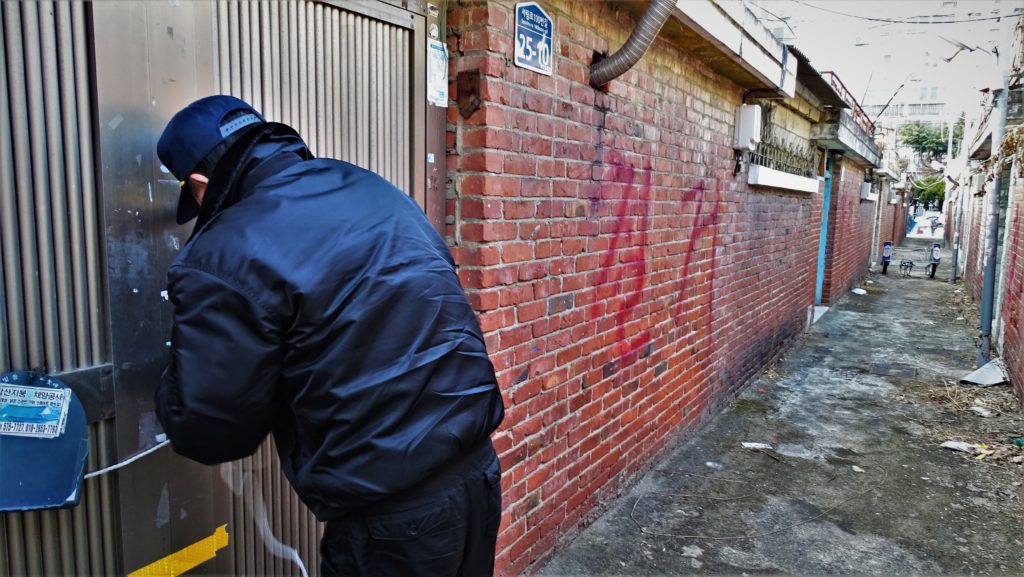
The Art of the Deal (Im-dong)
A friend and I were perusing a condemned neighborhood near the Kia baseball stadium and got spotted by a security guard who politely came to escort us out. But after we explained why we were there in the first place – to photograph beautiful old houses – he asked us to pick the house we most wanted to see and said he’d let us in (on the obvious condition that we not return). Stunned by this quid pro quo, we wasted no time in choosing the house that looked like it still had the most stuff inside and waited while he unfastened the rope to let us peek around inside. Out of respect, we didn’t return until months later when demolition had already claimed most of the houses and so didn’t get much of a story out of the area as a consequence. Still, being able to strike a deal with a security guard is a rare treat in urban exploring, so our hats are off to this guy.
The Author
Originally from Southern California, Isaiah is a Gwangju-based urban explorer who enjoys writing about the City of Light’s lesser-known quarters. When he’s not roaming the streets and writing about his experiences, he’s usually working or fulfilling his duties as the Gwangju News’ heavily caffeinated chief proofreader.





